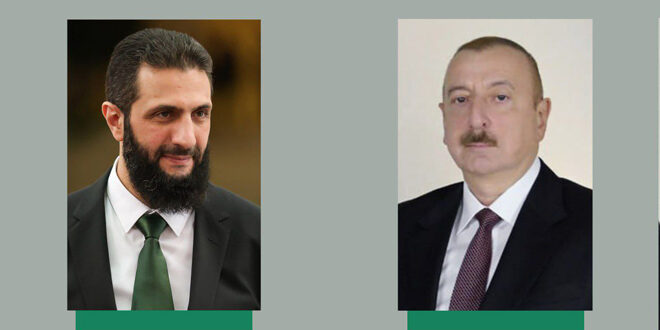by Turan Rzayev
The working visit of the Transitional President of the Syrian Arab Republic, Ahmad al-Shara, to the Republic of Azerbaijan has taken place. This visit was noteworthy from multiple perspectives.
First and foremost, it should be noted that during his visit, President Ahmad al-Shara held both expanded-format and one-on-one meetings with the President of Azerbaijan, Ilham Aliyev. During these meetings, a wide range of issues were thoroughly discussed.
In fact, President al-Shara’s visit to Azerbaijan was anticipated. The last time President Ilham Aliyev met with President al-Shara was during the 4th Antalya Diplomacy Forum, held at the invitation of Turkish President Recep Tayyip Erdoğan. At that meeting, the two leaders exchanged views on several topics, and it was then that President Aliyev extended an official invitation to his Syrian counterpart to visit Azerbaijan.
Ahmad al-Shara’s visit to Baku could have significant political and economic implications for the transitional leadership of Syria. In terms of Syria’s reintegration into the international community, the visit was of vital importance. It is no longer a secret that Azerbaijan has emerged as a driving force in this process.
Particularly as a strategic player in the global energy market, Baku can serve as a real and effective partner in the restoration of Syria’s energy sector. Interestingly, some of the statements made during the Antalya meeting between the Azerbaijani and Syrian presidents are already being translated into concrete diplomatic steps. For instance, President Aliyev had stated that “Azerbaijan is ready to participate in Syria’s reconstruction.” Today, we are witnessing practical measures in that direction. The cooperation model proposed by Syria presents Azerbaijan with favorable opportunities to expand its long-term investment and strategic influence.
Azerbaijan’s experience in the oil and gas industry, its advanced technological expertise in the sector, and the presence of internationally recognized companies like SOCAR make it an attractive partner for Damascus. Not long ago, SOCAR’s interest in Syria’s energy sector was openly voiced at the leadership level in Turkey. On July 12, during President al-Shara’s visit, a Memorandum of Understanding was signed between the State Oil Company of Azerbaijan (SOCAR) and the Government of the Syrian Arab Republic.
Baku approaches this issue not only from an economic standpoint but also from a strategic one. The restoration of Syria’s energy infrastructure is essential for peace, stability, and economic integration in the region, and Azerbaijan is well-positioned to be a leading actor in this process.
Another important aspect of this cooperation is its potential to partially break Syria’s long-standing international isolation. A partnership with Azerbaijan could link Syria with a sincere and mutually beneficial ally, outside the influence of the West. This may allow Damascus to regain diplomatic and economic breathing space.
At the same time, one of the most important symbolic messages of this visit is that Syria is no longer perceived as a chaotic and high-risk territory. On the contrary, it is increasingly seen as a reliable partner by serious regional actors. A case in point is President al-Shara’s recent appointment of II Corps Commander Fehim Isa, an ethnic Turkmen, as Deputy Defense Minister and Commander of the northern regions. This move signals that there is a security framework in place for potential SOCAR operations in Syria. Moreover, it also carries strategic importance for preserving internal balance and sending an inclusive message to minority groups within the country.
The Israel factor should not be overlooked. Azerbaijan’s close strategic ties with Israel could open up new dimensions for coordination in regional energy networks. The idea of future energy corridors crossing Syrian territory and extending all the way to Israel is beginning to look increasingly realistic.
Baku may also play a mediating role in the normalization of Syria–Israel relations. It is not out of the question that the two leaders may have discussed the prospect of holding talks in Baku under Azerbaijani mediation. Such a meeting may well take place in the near future.
Against this backdrop, it is fair to say that Ahmad al-Shara’s visit to Baku was more than just a diplomatic gesture. It may represent the laying of a foundation for a new cooperation architecture that bridges the South Caucasus with the Eastern Mediterranean. Built on mutual respect and shared interests, these relations could serve as a model for ensuring balance and stability in the wider region.

